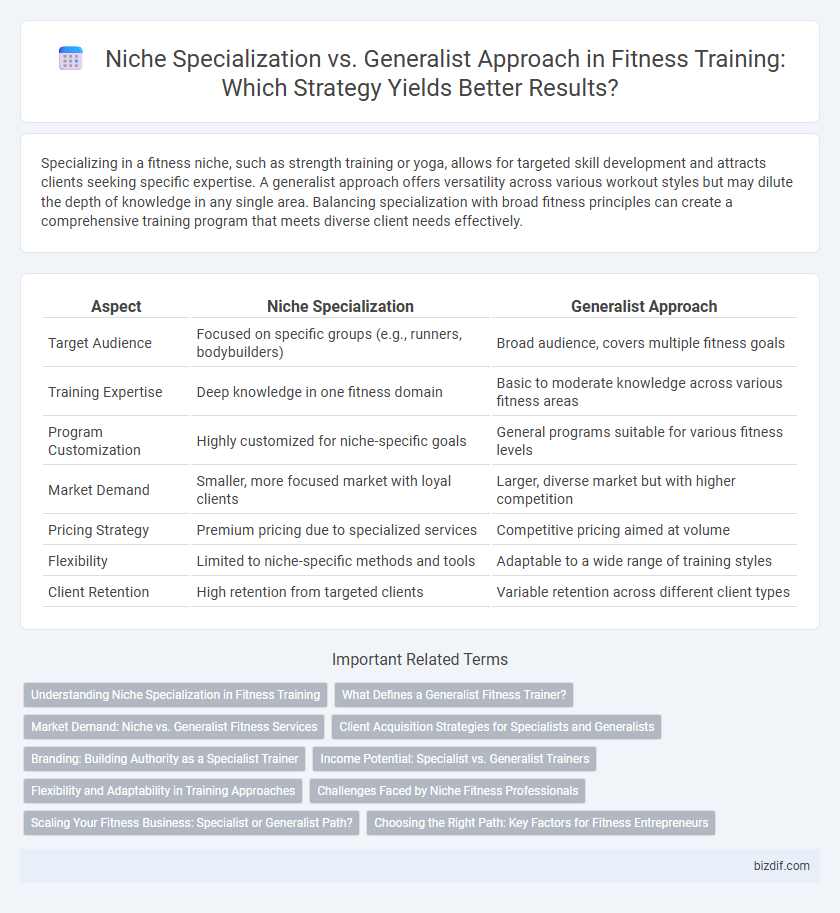Specializing in a fitness niche, such as strength training or yoga, allows for targeted skill development and attracts clients seeking specific expertise. A generalist approach offers versatility across various workout styles but may dilute the depth of knowledge in any single area. Balancing specialization with broad fitness principles can create a comprehensive training program that meets diverse client needs effectively.
Table of Comparison
| Aspect | Niche Specialization | Generalist Approach |
|---|---|---|
| Target Audience | Focused on specific groups (e.g., runners, bodybuilders) | Broad audience, covers multiple fitness goals |
| Training Expertise | Deep knowledge in one fitness domain | Basic to moderate knowledge across various fitness areas |
| Program Customization | Highly customized for niche-specific goals | General programs suitable for various fitness levels |
| Market Demand | Smaller, more focused market with loyal clients | Larger, diverse market but with higher competition |
| Pricing Strategy | Premium pricing due to specialized services | Competitive pricing aimed at volume |
| Flexibility | Limited to niche-specific methods and tools | Adaptable to a wide range of training styles |
| Client Retention | High retention from targeted clients | Variable retention across different client types |
Understanding Niche Specialization in Fitness Training
Niche specialization in fitness training centers on tailored programs designed for specific populations or goals, such as athletes, seniors, or those with chronic conditions, enhancing targeted results and injury prevention. It leverages expert knowledge in areas like strength training for runners or rehabilitation exercises for post-surgery clients, leading to more efficient progress and client satisfaction. Specialized fitness trainers use precise assessment tools and evidence-based techniques to optimize workouts, ensuring measurable improvements in performance and health outcomes.
What Defines a Generalist Fitness Trainer?
A generalist fitness trainer possesses a broad knowledge base across multiple fitness disciplines, including strength training, cardiovascular conditioning, flexibility, and nutrition. They tailor programs that address overall health and wellness, catering to diverse client goals without deep specialization in a single area. Their adaptive skill set allows them to design balanced workout plans suitable for beginners and intermediate clients seeking comprehensive fitness improvements.
Market Demand: Niche vs. Generalist Fitness Services
Niche specialization in fitness training targets specific groups such as prenatal clients, athletes, or seniors, meeting distinct market demands with tailored workout programs and expertise. Generalist fitness services attract a broader audience by offering diverse training options, appealing to clients seeking variety and adaptability in their routines. Market analysis shows niche specialists often command higher fees due to expertise, while generalists benefit from larger client bases and consistent demand.
Client Acquisition Strategies for Specialists and Generalists
Specialists in fitness training attract clients by emphasizing targeted expertise, leveraging niche marketing, and building strong reputations in specific areas such as rehabilitation, strength training, or yoga. Generalists utilize broad client acquisition strategies by appealing to a wide audience, offering diverse programming, and capitalizing on versatility to meet varying fitness goals. Both approaches benefit from digital marketing, social media presence, and referral networks, but specialists often rely on targeted content and partnerships within their niche to drive client growth.
Branding: Building Authority as a Specialist Trainer
Focusing on niche specialization in fitness training enhances branding by establishing authority and credibility within a targeted audience, such as strength training for athletes or rehabilitation for seniors. Specialist trainers attract loyal clients seeking expert guidance tailored to specific goals, increasing trust and perceived value. Generalist approaches may reach broader markets but often lack the distinct positioning needed to dominate competitive fitness niches and build a strong, recognizable brand.
Income Potential: Specialist vs. Generalist Trainers
Specialist trainers targeting high-demand niches such as corrective exercise or sports performance often command higher fees and attract loyal clients seeking expert guidance, which boosts income potential significantly. Generalist trainers offering broad fitness services may have a larger client base but face lower average session rates and higher competition, limiting earnings growth. Focusing on a niche allows specialists to differentiate their services, enhance client retention, and justify premium pricing, resulting in more consistent and increased revenue streams compared to generalists.
Flexibility and Adaptability in Training Approaches
Niche specialization in fitness training hones specific skills or muscle groups, enhancing performance in targeted activities but potentially limiting overall flexibility. The generalist approach promotes adaptability by engaging diverse exercises that improve a wide range of physical abilities, supporting balanced development and injury prevention. Combining both methods can optimize training outcomes, ensuring specialized strength while maintaining versatile fitness capacity.
Challenges Faced by Niche Fitness Professionals
Niche fitness professionals encounter challenges such as limited client pools and increased competition within specialized markets like prenatal training or kettlebell workouts. Maintaining up-to-date expertise requires continuous education and certifications tailored to specific domains, increasing time and financial investments. Balancing personalization with scalability often demands innovative programming and marketing strategies to sustain growth and client retention.
Scaling Your Fitness Business: Specialist or Generalist Path?
Specializing in a fitness niche such as strength training or yoga allows businesses to target a dedicated clientele, increasing brand authority and premium pricing potential. Conversely, adopting a generalist approach appeals to a broader market, facilitating faster client acquisition but often resulting in lower retention rates due to less tailored programs. Strategic scaling depends on aligning business goals with market demand, balancing specialization benefits with the flexibility of diversified service offerings.
Choosing the Right Path: Key Factors for Fitness Entrepreneurs
Fitness entrepreneurs must assess market demand, target audience preferences, and personal expertise when deciding between niche specialization and a generalist approach. Specializing in areas like strength training for seniors or high-intensity interval training attracts a dedicated client base, while a generalist approach offers broader market reach and diversified service options. Understanding competition, resource availability, and long-term business goals ensures the selection of a strategic path aligned with growth potential and client retention.
Niche Specialization vs Generalist Approach Infographic

 bizdif.com
bizdif.com